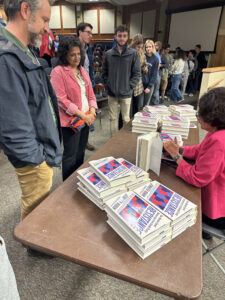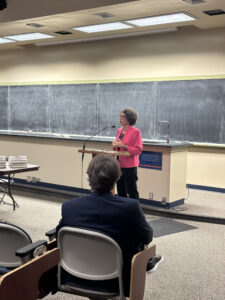By Hugh Toner, Staff Writer
On Tuesday, the Jewish Studies Department hosted a lecture by Washington Post columnist Jennifer Rubin in Mara Auditorium. The lecture focused on the different aspects of division in American society, the importance of informative journalism and the role of public monuments in education and reconciliation.
Professor Stephen Stern of the Jewish studies department opened the event by welcoming attendees and introducing Rubin’s work as a journalist.
“Whether you agree or not with her or not, you’re going to think [her columns] provoke discussion,” Stern said. In addition to writing for The Washington Post, Rubin is a contributor to MSNBC and the author of “Resistance: How Women Saved Democracy from Donald Trump.”

After the lecture, Jennifer Rubin signed copies of her book, “Resistance: How Women Saved Democracy from Donald Trump.”
Rubin began the lecture by comparing American society’s current divisions to its divisions before the Civil War and Reconstruction era. She suggested that a lack of national reckoning has led to the societal problems of pre-Civil War America persisting today, stating that “unlike other countries, which after a great war go through a reconciliation process, go through truth panels and a sense of national reckoning, Americans have never done that as a whole society.”
Rubin then mentioned Lincoln’s invocation of the Declaration of Independence in the Gettysburg Address and discussed two differing visions Americans faced during the Civil War: one based on the ideals of the Declaration of Independence and the revolution, and one based on a hierarchical structure of oppression that continues today.
She stated, “The Christian church of the south and various parts of the country help reinforce a certain view of America and a certain view of society which is hierarchical.” She explained how our societal problems have become more complex, citing constitutional protections for political minorities in the Senate and the development of “red and blue” states.
She then discussed the media’s role and responsibility in navigating difficult times, criticizing social media for creating polarization. She stated, “The reason why you have polarization and extremism fostered on social media is because it’s intentional. Angered and upset forces perpetuate engagement, which means more people online, which means more advertising, which means more scraping of data. These are money-making operations.”

Jennifer Rubin speaking in Mara Auditorium. (Hugh Toner/The Gettysburgian)
Rubin also criticized legacy media companies, saying, “They’re playing the same game, and that same game is creating entertainment, creating anxiety, creating instantaneous clips. But does that help make an informed citizen? Does that help ameliorate divides? Does that system even help us understand each other? It doesn’t, obviously.”
Before answering questions from the audience, Rubin expressed her support of public monuments in education, saying, “I’m a big believer in the role of public monuments, public ceremonies, public installations; that seeing, touching, observing, is a much more effective way of learning than simply speaking from a podium. … It’s a way of educating the public and bringing them into the conversation.”
She also stated her optimism for the society to move past division and continue the unfinished work Lincoln referred to and the role of Gettysburg College students in shaping future discussions surrounding the Civil War.
“I think Gettysburg College might just be the place to do this,” she said. “You guys certainly have the monuments and the vantage point to teach the country something, so I hope you do.”
